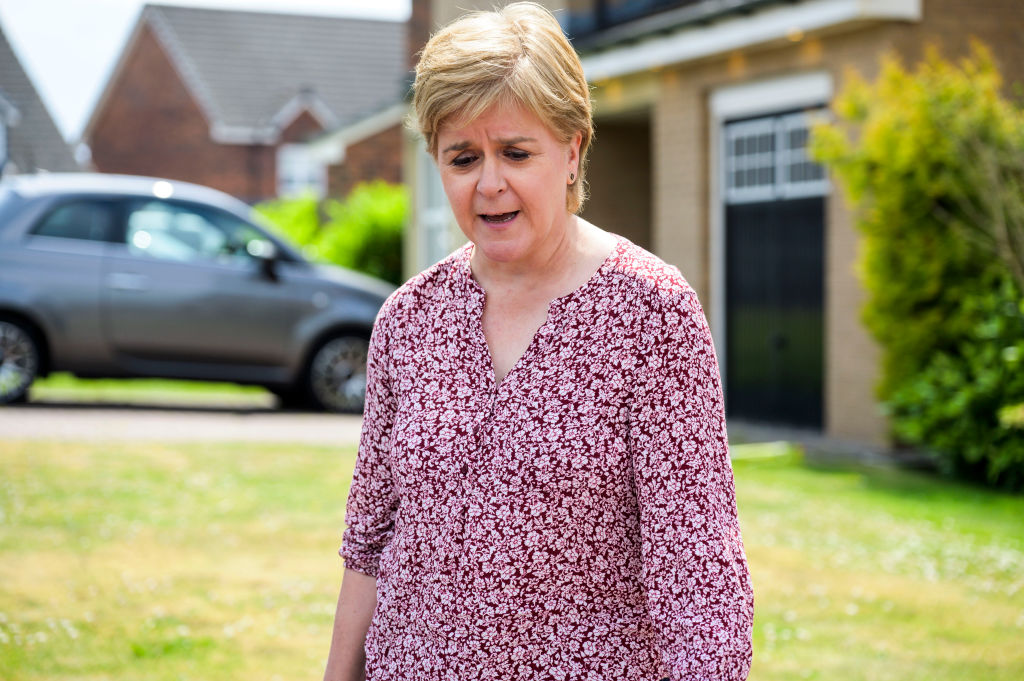Scottish Nationalists are putting a brave face on the latest opinion poll showing Scottish Labour apparently winning the race for Westminster. The Times/Panelbase survey suggests that Labour is on course to return 26 Scottish seats at the next general election against the SNP’s 21. The nationalist are currently the third largest party in Westminster with 48 MPs, so this would be a shocking reversal of fortune. The survey was conducted between 12 and 15 June – just after Nicola Sturgeon had been arrested and released under Operation Branchform – the police investigation into irregularities in party funds and fundraising.
Ach, it’s not as bad as it looks, say the Nats. It’s only one poll, and blowback from Sturgeon’s arrest was expected. Humza Yousaf’s support is actually up by four points to, er, minus 12, even if Sturgeon’s has collapsed 38 points to minus 18. The SNP is still comfortably ahead of Labour in voting intentions for the Scottish Parliament. And just look at the Panelbase figures for independence: 47 per cent Yes. That’s higher than in 2014. The Union, say the SNP, is still on borrowed time.
The fall in SNP support is most marked amongst former and current Yes supporters
That’s as may be, but it appears that support for independence is now significantly more resilient than support for the SNP. The reverse has generally been the case in the past, as Alex Salmond has been keen to point out. And this is not perhaps something that the SNP should be celebrating. On the contrary, we are witnessing the first serious cracks appearing in the SNP’s extraordinary decade-long domination of Scottish politics. Its fall could be as rapid as its rise.
It is worth remembering that, as recently as the 2010 general election, Labour returned 41 Scottish seats against the SNP’s six. What happened thereafter was, of course, the independence referendum campaign of 2014 which transformed the Scottish political landscape. Many former Labour voters turned to Yes in that ‘festival of democracy’ as it was called. And in the aftermath, under Nicola Sturgeon, the SNP cleaned up.
In the 2015 ‘tsunami’ election, the SNP won an astonishing 56 out of 59 Scottish seats. Labour was reduced to one solitary MP, as were the Scottish Tories and the Scottish Liberal Democrats. But what goes up must come down and there are good reasons for thinking that political gravity is beginning to reassert itself.
According to professor John Curtice, the fall in SNP support is most marked amongst former and current Yes supporters. They are looking more favourably at Labour given the change in its political fortunes under Keir Starmer. This is hardly surprising. Nicola Sturgeon has always claimed that independence is necessary because Scots invariably find themselves ‘being governed by parties they haven’t voted for’. But this really only applied during the Tory years and at the fag end of New Labour (And even then it was more myth than reality since Tony Blair remained popular in Scotland almost to the end). Well, now Scots have a chance to be governed by a party they did vote for: Labour. For those ex Labour Yes supporters this is a compelling offer: a chance to help kick the Tories out of Number Ten.
It’s not as if the SNP has been giving Scots much reason to continue voting for them. The Scottish government is in almost as bad a state as the UK Tory one. The list of policy failures on everything from educational attainment to waste recycling speaks for itself. And then of course we’ve had the extraordinary spectacle of Operation Branchform, the police swooping on SNP headquarters and that forensic tent erected outside the former First Minister’s Uddingston home.
Nicola Sturgeon staged a somewhat one-sided press conference there yesterday (Sunday) to again plead her innocence. ‘I know I have done nothing wrong’, she insisted, refusing to say whether or not she had considered resigning the party whip. She is being widely criticised for hypocrisy since this was what she required of SNP politicians, such as the former MP, Michelle Thomson, in the past when they had the slightest brush with the law. Humza Yousaf has endorsed his former leader’s determination to cling on – and has even sent her flowers.
But in the real world Nicola Sturgeon has, for the time being, ceased to be the unalloyed electoral asset she was in the past. The party may not quite be facing an ‘extinction event’ as Alex Salmond the leader of the rival nationalist party Alba puts it. But it’s no longer the formidable election-winning machine that it was.
Humza Yousaf has not had much of a honeymoon since his election as leader. He has little to look forward to now apart from blood, sweat and tears as a divided Scottish National Party faces the possible loss of more than half its MPs.







Comments